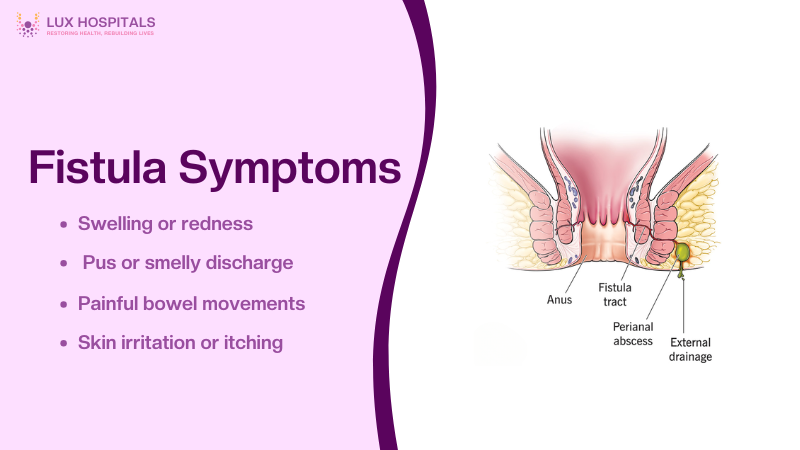Fistula Symptoms and Risks: When to Seek Immediate Medical Attention

Fistula is a medical condition that should not be ignored. Delaying treatment can lead to chronic complications, persistent pain, and infections that become increasingly difficult to manage. Recognizing the symptoms early and seeking prompt medical care is essential to prevent the condition from worsening.
This article highlights the key causes, common symptoms, potential risks, and stresses the importance of early treatment to avoid serious health issues and ensure a quicker, more effective recovery.
What is Fistula?
A fistula is an abnormal communication between two parts of the body, e.g., the anal canal and the skin. It is typically a result of infection causing an abscess that does not heal. This is a disease that should be treated in a timely fashion to avoid complications.
Fistula Symptoms
If you notice any of the following fistula symptoms, consult a doctor immediately:
- Recurring pain and discomfort in the anus
- Swollen lumps or swelling in the anus
- Pus or bloody discharge through a near-anal opening
- Smelly discharge
- Recurrent anal abscesses
- Fever and chills due to infection
- Redness and swelling near the infected area
- Painful walking or sitting
- Incomplete bowel movements due to obstruction
Ignoring these fistula symptoms may lead to severe fistula complications and emergency fistula surgery.
Complications and Risks of Ignoring Fistula Symptoms
- Systemic Infections: The infection may extend to the rest of the body, causing life-threatening conditions like sepsis, an emergency situation demanding instant medical care.
- Anal Deformities: Fistula tracts may become larger over time, influencing the anal canal shape and function and making defecation highly difficult.
- Tissue Necrosis: Tissue death in the surrounding tissues can result from chronic inflammation, which is harder to treat.
- Risk of Cancer: Although uncommon, untreated chronic fistula infections lasting many years may lead to anal cancer.
- Severe Scarring and Recurrence: Untreated fistula tends to increase the risk of severe scarring, which may result in a greater recurrence rate of fistula.
- Fecal Incontinence: The infection can also cause the muscles of the anal sphincter to become weak, leading to loss of control over bowel movements partially or completely.
- Multiple Fistula Tracts: Fistula Symptoms Ignored can result in multiple communicating fistula tracts, and this complicates the treatment highly, including large-scale operation
What happens if a fistula is left untreated?
Fistula symptoms, if left untreated, slowly deteriorate, and treatment for fistula becomes complicated in the long run. Fistula, if not treated, can:
- Repeatedly cause infection and abscess
- Increase pain and discomfort over time
- Result in anal deformity needing surgery
- Lead to ongoing purulent drainage
- Decrease quality of life through constant irritation and discomfort
- Change bowel function and cause incontinence
When Not to Ignore Fistula Symptoms?
Do not ignore fistula symptoms if you have:
- Continuous pus discharge
- Recurring swelling around the anus
- Severe pain that aggravates over time
- Severe fever with chills
- Obstruction in passing stool
- Mysterious fatigue and weakness
- Fistula Multiple fistula openings or increasing infection
These are symptoms of a developing condition requiring fistula treatment right away.
When to See a Doctor?
You should go visit a doctor for fistula treatment if you experience recurring fistula symptoms that are not being resolved by your home care. You must visit a doctor right away if:
- You have pain and swelling in the area of the anus that lasts longer than a few days.
- There is recurring discharge of pus, blood, or foul-smelling fluid through an opening by the anus.
- You have a fever or chills, indicating that the infection may be spreading.
- You have pain or are having trouble passing stools.
- You have been diagnosed with a non-healing anal abscess.
- You notice an increase in discomfort when sitting or walking.
- There is swelling or redness around the infected area
- The affected area has multiple openings, which indicate the formation of multiple fistula tracts.
- You have difficulty with bowel control due to infection complications.
Conclusion
Ignoring fistula symptoms leads to serious complications that demand lengthy fistula treatment. In case you or someone nearby is affected by fistula symptoms, report to the medical center instantly. Early fistula treatment prevents serious infection, minimizes pain, and enhances the standard of living. Seek advice from a medical expert on the best fistula treatment methods before the condition deteriorates.
Frequently Asked Questions
Typical fistula symptoms are anal pain, pus or blood discharge, swelling, and infection.
If you have fistula symptoms on a regular basis, like anal pain, pus discharge, or swelling, visit a doctor right away for fistula treatment.
Fistula treatments with the new methods laser surgery, are less painful and have quick recovery.
Fistula, if not treated, may lead to chronic infection, intense pain, and more chances of complications. Consult a doctor immediately.
Symptoms of fistula recurrence include pain, swelling, pus or fluid discharge near the anus, irritation, and sometimes fever or discomfort during bowel movements.




















